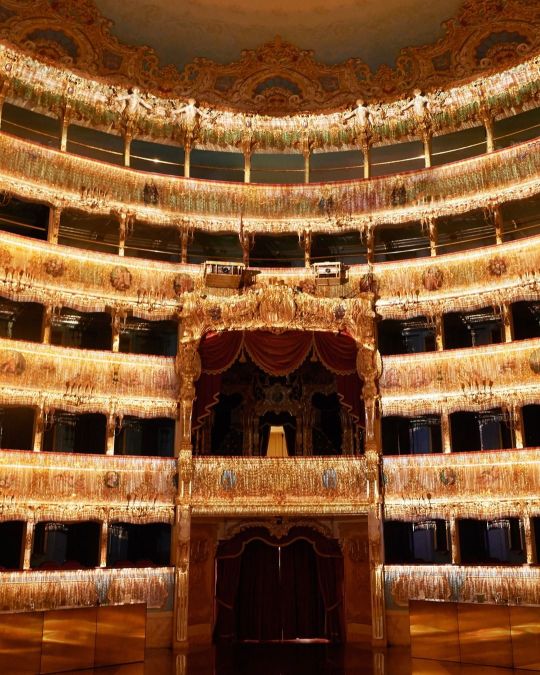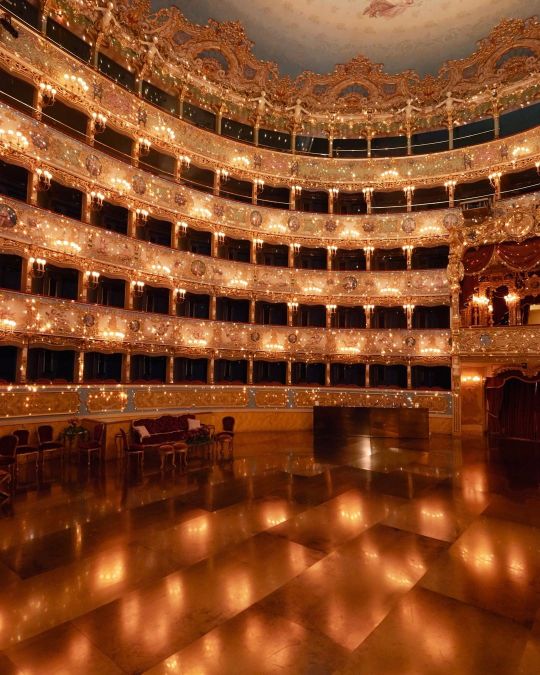#teatro la fenice
Text
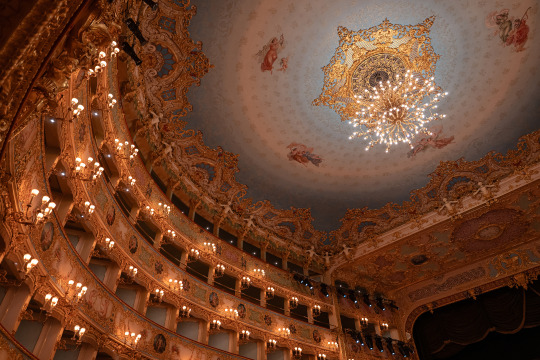
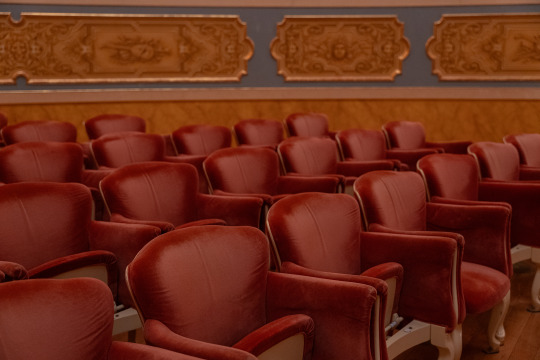



Teatro la Fenice, Venice
Photography by Karina Więcławska
More on silkportraits
#venice#venezia#teatro la fenice#dark aesthetic#dark academia#dark academia aesthetic#theather#opera#italy#travel photography#my photography#karina wieclawska#karina więcławska
468 notes
·
View notes
Text

— Music's Too Sad Without You by Kylie Minogue & Jack Savoretti
#lyrics#the one and only kylie#kylie minogue#jack savoretti#music's too sad without you#mtswy#golden#venice#teatro la fenice#lyrics edit
5 notes
·
View notes
Text

May 16. 1792 the fantastic Operahouse Teatro La Fenice in Venezia was opened.
Take a look on the history of that beautiful building. Here we see a antique postcard from 1902 that shows the auditorium.
#Teatro La Fenice#La Fenice#opera house#opera#classical music#music history#classical composer#aria#composer#bel canto#classical studies#Gioachino Rossini#Rossini#Vincenzo Bellini#Bellini#Gaetano Donizetti#Donizetti#Giuseppe Verdi#Verdi#diva#prima donna#maestro#chest voice#La Scala#Ernani#La traviata#Royal box#Ludwig van Beethoven#Beethoven#Richard Wagner
4 notes
·
View notes
Text

Manifesto della prima assoluta della Traviata di Giuseppe Verdi, Teatro La Fenice, Venezia, 1853.
0 notes
Text
Si ricomincia!
Quest’anno la pausa estiva, se così la possiamo chiamare, è stata più lunga del previsto a causa di piccoli e grandi problemi non sempre dipendenti dalla mia volontà. Come state?Avete fatto qualcosa di particolare in questo periodo estivo?Io come sempre sono stata a trovare un’amica a Trieste, città che adoro e che sento sempre più mia, poi, da lì, è possibile fare diverse escursioni fuori porta.…

View On WordPress
#arte#bell&039;italia#breve storia del castello di miramare#carlotta del belgio#castello di miramare#cultura#emozioni#escursioni estive#estate 2023#grignano#il mondo di shioren#massimiliano d&039;asburgo#piazza Unità#spettacolo#teatro la fenice#trieste#un giorno a venezia#venezia
1 note
·
View note
Text
come ho detto nel mio post precedente ho collaborato alla creazione di 2 costumi per il Falstaff della Fenice di Venezia
Vi metto le foto dei costumi finiti e poi vi racconto tutti i casini che sono successi mentre li facevamo
Il primo è il vestito nero di quickly ( noi abbiamo fatto i fiori sul fondo dell'abito )
il secondo è il mantello di Nanetta ma purtroppo si vede poco ( dopo metterò le foto della realizzazione dove si vede molto meglio )

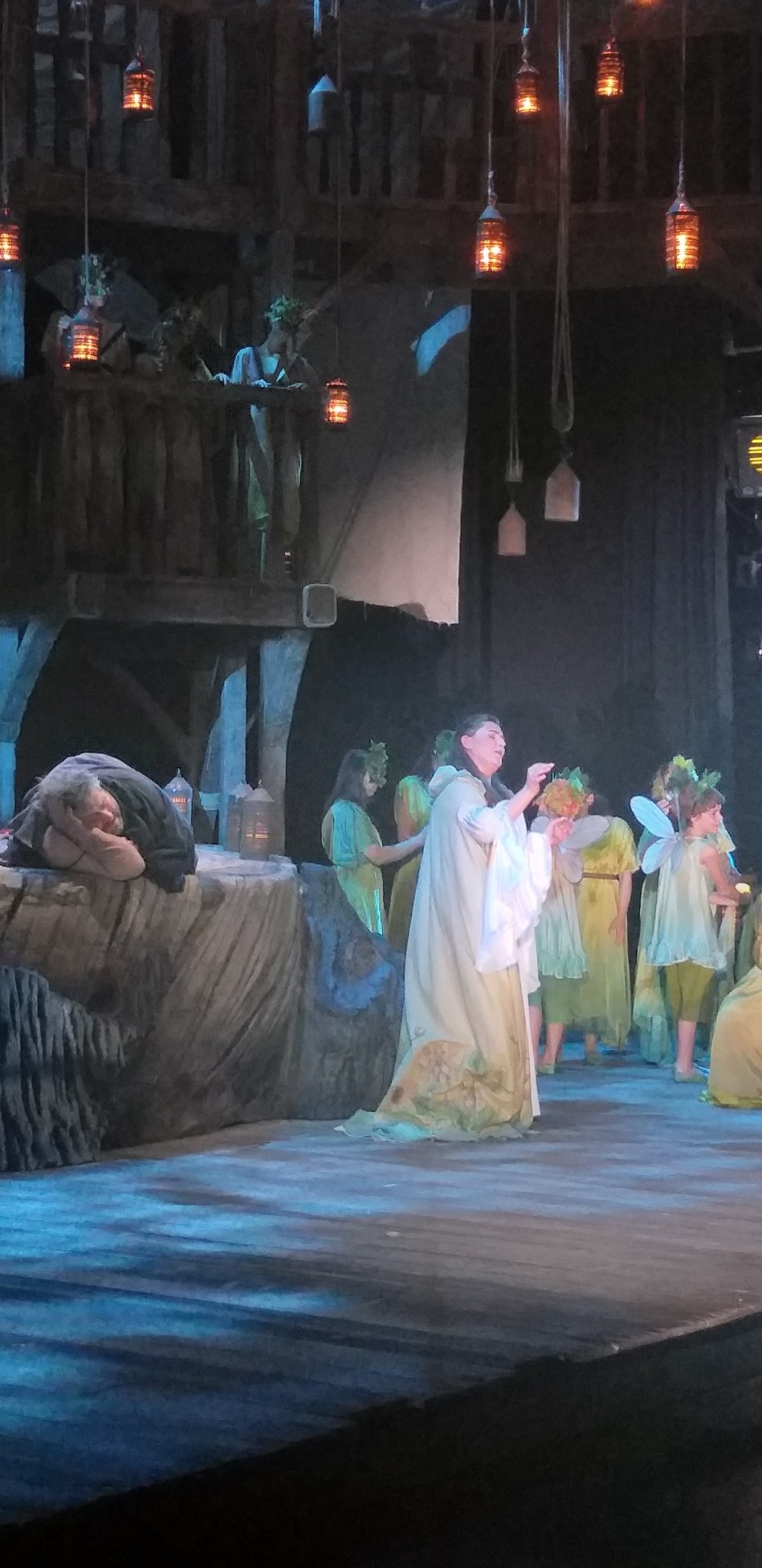

1 note
·
View note
Text
Pian e forte
Giovanni Gabrieli (c1554/57-1612): Sonata a 8 pian e forte; arrangiamento di Fabio Codeluppi. Membri dell’Orchestra del Teatro La Fenice di Venezia.
.
youtube
View On WordPress
0 notes
Text


Teatro la fenice, Italy.
#postlarım#sorun-var#photography#my post#interior decorating#interior design#italy#italia#aesthetic#art
102 notes
·
View notes
Text

Teatro la Fenice, Venice
Photography by Karina Więcławska
More on silkportraits
#venice#venezia#teatro la fenice#italy#architecture#interior#pretty places#opera#theather#my photography#travel photography#karina wieclawska#karina więcławska
43 notes
·
View notes
Text
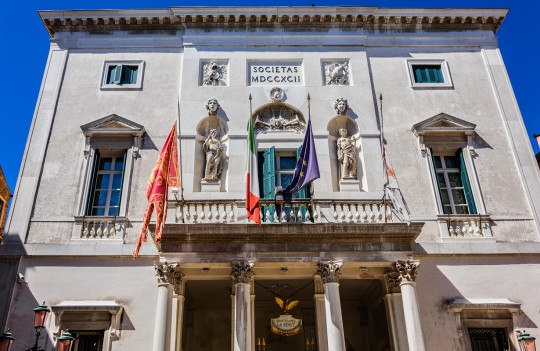
Day 91: Teatro La Fenice | Daily Venice for you!
#Venezia#Venice#Italia#Italy#art#Architecture#history#Travel Photography#water#bridge#river#photo#sky#old city#cityscpae#squares#murano#Burano#urban travel#photography#tarvel#Tourism#spring#summer#Europe#venetian carnival#travel#nature#landscape#city
21 notes
·
View notes
Text
opera stream alert!

What: La Fille du Régiment, Donizetti (Teatro la Fenice 2022, dir. Doucet & Barbe)
When: Saturday December 23rd, 2:00pm EST
Where: Kosmi – link is here!
Who: everyone is welcome!
Extra info: a charming comedy in two acts, featuring all the classics: love vs. family duty; a tenor fighting for his life with nine high C's in a single aria; french nationalism; and, above all, a girl and her 1000 dads.
#sasha speaks#opera streams#la fille du regiment#there's still like an hour left on the poll but it looks like marie is in the lead so i'm calling it now#for friends in other timezones this is 8pm central europe time and 11am west coast#the greatest number of people usually can make it around that time...i hope#opera#opera tag#la fille du régiment#the daughter of the regiment#giving you lot a taste of a non pelly production too. for fun#overture short film aside i really liked this version
25 notes
·
View notes
Text
Opera on YouTube 3
Il Barbiere di Siviglia (The Barber of Seville)
Mario Lanfrachi studio film, 1965 (Sesto Bruscantini, Valeria Mariconda, Ugo Benelli; conducted by Alberto Zedda; no subtitles)
Jean-Pierre Ponnelle studio film, 1974 (Hermann Prey, Teresa Berganza, Luigi Alva; conducted by Claudio Abbado; English subtitles)
New York City Opera, 1976 (Alan Titus, Beverly Sills, Henry Price; conducted by Sarah Caldwell; English subtitles)
Arena Sferisterio, 1980 (Leo Nucci, Marilyn Horne, Ernesto Palacio; conducted by Nicola Rescingo; no subtitles)
Teatro Real de Madrid, 2005 (Pietro Spagnoli, Maria Bayo, Juan Diego Flórez; conducted by Gianluigi Gelmetti; Arabic subtitles)
Teatro la Fenice, 2008 (Roberto Frontali, Rinat Shaham, Francesco Meli; conducted by Antonino Fogliani; Italian subtitles)
Royal Opera House, Covent Garden, 2009 (Pietro Spagnoli, Joyce DiDonato, Juan Diego Flórez; conducted by Antonio Pappano; English subtitles)
Vienna State Opera, 2019 (Rafael Fingerlos, Margarita Gritskova, Juan Diego Flórez; conducted by Evelino Pidó; English subtitles)
Arena di Verona, 2022 (Leo Nucci, Nino Machaidze, Dmitry Korchak; conducted by Daniel Oren; English subtitles)
Garsington Opera, 2023 (Johannes Kamler, Katie Bray, Andrew Stenson; conducted by Douglas Boyd; English subtitles)
Rigoletto
Wolfgang Nagel studio film, 1977 (Rolando Panerai, Franco Bonisolli, Margherita Rinaldi; conducted by Francesco Molinari-Pradelli; Japanese subtitles)
Metropolitan Opera, 1977 (Cornell MacNeil, Plácido Domingo, Ileana Cotrubas; conducted by James Levine; no subtitles)
Metropolitan Opera, 1981 (Cornell MacNeil, Luciano Pavarotti, Christiane Eda-Pierre; conducted by James Levine; no subtitles)
Jean-Pierre Ponnelle film, 1982 (Ingvar Wixell, Luciano Pavarotti, Edita Gruberova; conducted by Riccardo Chailly, English subtitles)
English National Opera, 1982 (John Rawnsley, Arthur Davies, Marie McLaughlin; conducted by Mark Elder, sung in English)
La Monnaie, Brussels, 1999 (Anthony Michaels-Moore, Marcelo Álvarez, Elizabeth Futral; conducted by Vladimir Jurowski; no subtitles)
Arena di Verona, 2001 (Leo Nucci, Aquiles Machado, Inva Mula; conducted by Marcello Viotti; Italian subtitles)
Zürich Opera house, 2006 (Leo Nucci, Piotr Beczala, Elena Mosuc; conducted by Nello Santi; no subtitles)
Paris Opera, 2016 (Quinn Kelsey, Michael Fabiano, Olga Peretyatko; conducted by Nicola Luisotti; English subtitles)
Teatro Massimo, 2018 (George Petean, Ivan Ayon Rivas, Grazia Schiavo; conducted by Stefano Ranzani; English subtitles)
Così Fan Tutte
Vaclav Kaslik studio film, 1969 (Gundula Janowitz, Christa Ludwig, Luigi Alva, Hermann Prey; conducted by Karl Böhm; English subtitles)
Jean-Pierre Ponnelle studio film, 1988 (Edita Gruberova, Delores Ziegler, Luis Lima, Ferruccio Furlanetto; conducted by Nikolaus Harnoncourt; English subtitles) – Act I, Act II
Teatro alla Scala, 1989 (Daniela Dessì, Delores Ziegler, Josef Kundlak, Alessandro Corbelli; conducted by Riccardo Muti; Italian subtitles) – Act I, Act II
Théâtre du Châtelet, 1992 (Amanda Roocroft, Rosa Mannion, Rainer Trost, Rodney Gilfry; conducted by John Eliot Gardiner; English subtitles)
Vienna State Opera, 1996 (Barbara Frittoli, Angelika Kirschlager, Michael Schade, Bo Skovhus; conducted by Riccardo Muti; English and Italian subtitles)
Teatro Comunale di Ferrara, 2000 (Melanie Diener, Anna Caterina Antonacci, Charles Workman, Nicola Ulivieri; conducted by Claudio Abbado; no subtitles)
Zürich Opera House, 2000 (Cecilia Bartoli, Liliana Nikiteanu, Roberto Saccá, Oliver Widmer; conducted by Nikolaus Harnoncourt; no subtitles) – Act I, Act II
Opera Lyon, 2007 (Maria Bengtsson, Tove Dahlberg, Daniel Behle, Vito Priante; conducted by Stefano Montanari; French subtitles)
Salzburg Festival, 2009 (Miah Persson, Isabel Leonard, Topi Lehtipuu, Florian Boesch; conducted by Adam Fischer; English subtitles)
Zürich Opera House, 2009 (Malin Hartelius, Anna Bonitatibus, Javier Camarena, Ruben Drole; conducted by Frans Welser-Möst; English subtitles)
Aïda
San Francisco Opera, 1981 (Margaret Price, Luciano Pavarotti; conducted by Luis Garcia Navarro; no subtitles)
Metropolitan Opera, 1985 (Leontyne Price, James McCracken; conducted by James Levine; English subtitles) – Act I, Act II, Act III, Act IV
Teatro alla Scala, 1986 (Maria Chiara, Luciano Pavarotti; conducted by Lorin Maazel; English subtitles)
Metropolitan Opera, 1989 (Aprile Millo, Plácido Domingo; conducted by James Levine; English subtitles)
Teatro Comunale di Busseto, 2001 (Adina Aaron, Scott Piper; conducted by Massimiliano Stefaneli; Italian subtitles)
St. Margarethen Opera Festival, 2004 (Eszter Szümegi, Konstantin Andreev; conducted by Ernst Marzendorfer; English subtitles)
Metropolitan Opera, 2012 (Liudmyla Monastyrska, Roberto Alagna; conducted by Fabio Luisi; Russian subtitles)
Tbisili State Opera, 2017 (Maqvala Aspanidze, Franco Tenelli; conducted by Marco Boemi; Russian subtitles)
Teatro Colón, 2018 (Latonia Moore, Riccardo Massi; conducted by Carlos Vieu; Spanish subtitles)
Teatro la Fenice, 2019 (Roberta Mantegna, Francesco Meli; conducted by Riccardo Frizza; French subtitles)
#opera#youtube#complete performances#il barbiere di siviglia#rigoletto#così fan tutte#aida#gioachino rossini#giuseppe verdi#wolfgang amadeus mozart
14 notes
·
View notes
Text

Teatro la Fenice's new production of Mefistofele (with Alex Esposito in the title role) opens tonight so I've been seeing a lot of preview pics on the bird site, including this one and a video of the chorus from the end of this scene (which does look cool despite the schlubby costumes on the two leads, why are they putting Alex Esposito in sweatpants, come on, they put him in fishnets for Gounod!). ANYWAY it got me thinking about the various props I've seen used for the globe in "Ecco il mondo." For the uninitiated: this scene is set at Walpurgisnacht, the witches' sabbath and the primary event of the infernal social calendar. At one point the chorus presents their sexy demon overlord with a globe, symbolizing his mastery over the world and prompting Mefistofele's aria about the folly of humanity, at the end of which he smashes it. (The original libretto mentions a glass globe, and they did have sugar glass in the 1870s so I think that's probably what it would have been.)
Anyway, if you look at the video from later in the scene you can see that disco ball earth looks substantially redder and more burnt out by the end of the scene, a lighting effect which I am guessing takes place at the end of the aria. Which is pretty cool! I rather like that! Not as much as something that can go boom, but still pretty neat.
Other prop choices I've seen, roughly in order of how much I liked them:
Nothing (Festspielhaus Baden-Baden 2016, ft. Erwin Schrott). Come on. Why would you do it this way. I love this production quite a lot (and I actually otherwise really liked their Walpurgisnacht staging) but sometimes it makes questionable choices and this was one of them. Projecting equations all over the giant stage skull does not count. LET MEPH SMASH THINGS.
Giant blue lighted globe (I forget what production this was, but I saw this scene on youtube and couldn't find it when I looked just now). Pretty attractive visually, and stood out amid an otherwise red-dominated scene. Also the closest on this list to authorial intent (and, let's be real, Boito would certainly have used a lighted globe if it were possible to do safely at the time). However, you lose a lot of the impact if your singer has to carefully drop the prop globe into a trapdoor. This is kind of a common theme in this post and a principle by which I would abide: if you can't break it, use something else.
Cow heart (Bayerische Staatsoper 2015, ft. Rene Pape). Well, it's certainly creatively gross! I'll give it points for that. It was definitely not the worst idea this production had in re: Walpurgisnacht. But there are also a few problems: one is the destructibility issue outlined in the last entry. If you do something gross like that it's not gonna be as effective if it doesn't get to go splat, which obviously the prop cannot do. Another is that it doesn't really go with the symbolism of the aria (why is the world a cow heart, specifically?). A third is that the scene had already placed a bunch of writhing pregnant women downstage which made me worry that things were going to go a LOT darker than they actually did. I neither need nor want to see sacrificial baby yeeting in Mefistofele, but if your production is generally committed to maximum squalor, you probably shouldn't do anything that would make the audience imagine it and consequently doubt that commitment.
Paper globe (Teatro dell'Opera di Roma 2023, ft. John Relyea). A solid choice! He spikes it into an oil drum fire pit and and it makes a nicely scary-looking flame for an instant. It would have looked cooler if it were bigger, but it was definitely visually interesting (unlike most of the scene, alas; Relyea was typically fantastic but the director did not give him much to work with in this sequence beyond dressing him like Mussolini) and appropriately destructive.
Latex balloon (San Francisco Opera 1989, ft. Samuel Ramey). This one sometimes draws sniffs from opera purists for being cheap and tacky, but honestly that's entirely on-theme: behold the world! It's a piece of crap! This staging is iconic for a reason (it's on the cover of the dvd) and the simple balloon is satisfyingly destructible (Ramey dramatically stabs it with a very large pin), easy to bat around before destroying it, and inexpensive to replace. Full marks. Of course, this is a famous enough production that any other one that goes that route will probably be seen to be alluding to it.
Because I am obsessed with this opera and have an unattainable fantasy of directing it I have a lot of thoughts about all kinds of staging details, and so I would definitely return to the "inflatable earth" well, but distinguish it by getting Faust into the act: the second and third verse of the aria, after all, are about how dumb and generally shitty humans are. (And I think it's important for stagings of this sequence not to lose sight of him, which sometimes happens.) I'm picturing Meph dragging Faust up "onstage" and handing the globe off to him, as a representative of said dumb shitty humans (a lot of teasing interspersed with aggressive flirting going on here ofc). At the climactic "Ecco il mondo!" he flicks a finger in Faust's direction, and the globe explodes in his hands, to the great delight of the chorus. It's different, and it's a nice moment for making your singers cooperate in selling it (Faust, of course, has the more difficult job here since he'd have to play startled at a stage effect he is largely responsible for carrying off). My throughline for Mefistofele is that it's fundamentally a toxic, destructive love story that's still somehow weirdly ennobling for the participants on some level, and the Walpurgisnacht scene is a pivotal moment in that arc (it's where Meph's switch flips from "I want to win my wager" to "I want Faust") so that staging choice would be a another little thing that makes that relationship central.
#mefistofele#hot faust summer#faust friday#my imaginary production of mefistofele is fucking amazing you guys#child death for ts#(hypothetical and pretend)#how to destroy the world#opera
18 notes
·
View notes

